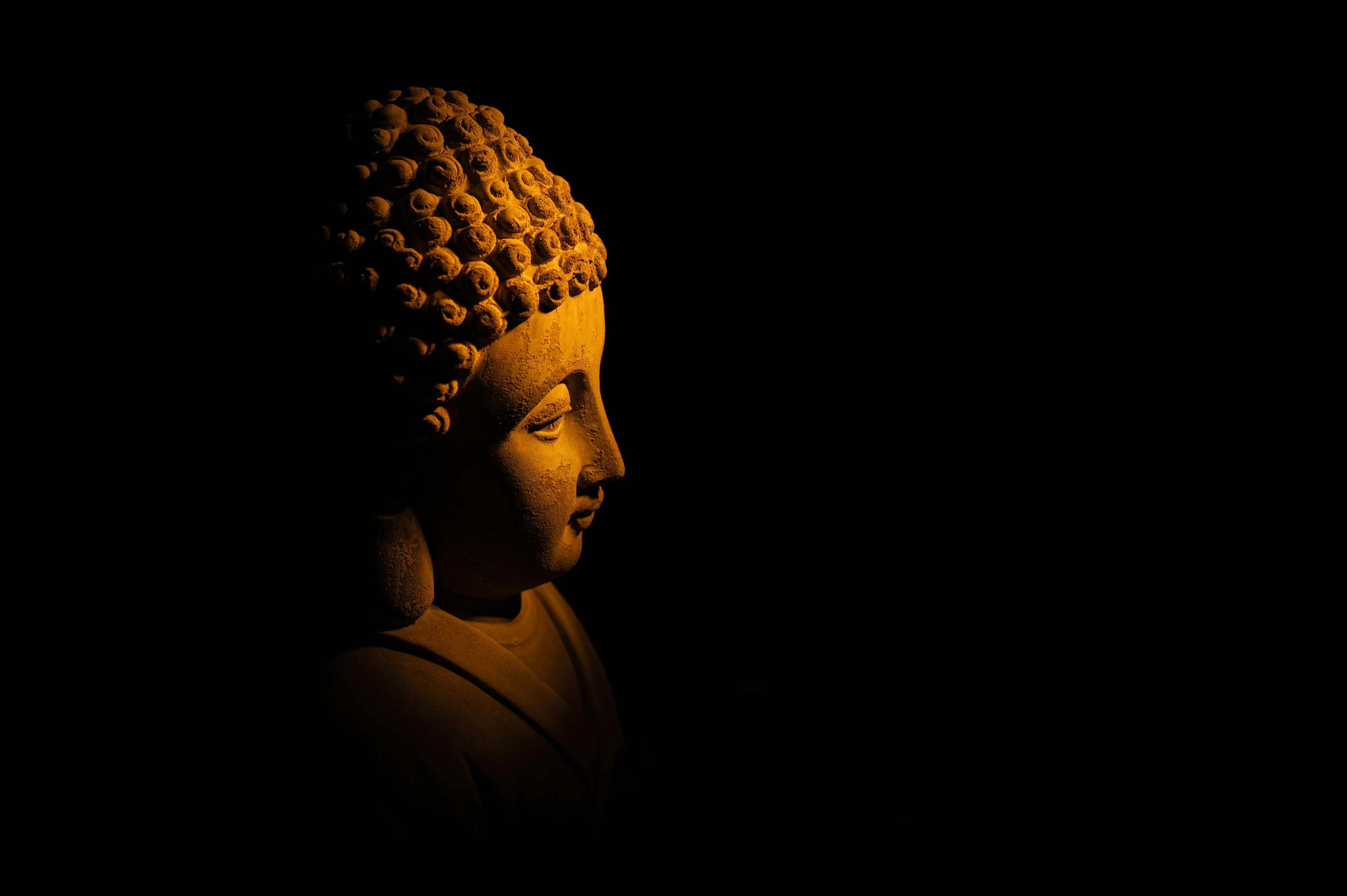Buddhist Foundations
Welcome! This page introduces Buddhist philosophy and ethics in a non-dogmatic, beginner-friendly way, especially for people in recovery.

— The Buddha
On This Page
- Buddhist Foundations
What Is Buddhism?
This is a soft landing for anyone curious about Buddhism, not as a belief system to adopt, but as a practical and ethical path to explore.
These teachings have been deeply meaningful to me in recovery. They helped me reconnect with reality in a clearer, more compassionate way. Buddhist philosophy doesn’t ask for blind faith, it invites investigation, reflection, and presence. That’s what drew me in. It speaks in terms of cause and effect, misunderstanding and clarity, and how craving arises downstream when the mind misreads reality.
Here you’ll find a gentle introduction to core Buddhist ideas, including ethical precepts, the Eightfold Path, and different forms of meditation. The goal isn’t to get it all perfect, it’s to begin with curiosity and keep walking the path. A key insight is that suffering (dukkha) often comes not from life itself but from how the mind interprets and resists experience. This is especially for folks in recovery who want something grounded, experiential, and not loaded with dogma. Buddhism, at its heart, is a path of liberation through understanding.
If you’re more of a listener, these two talks offer different but complementary doorways into the heart of practice. One speaks to our deeper sense of identity and belonging, the other to the power of living deliberately and with awareness:
- Alan Watts: The Real You – A poetic exploration of selfhood, illusion, and interconnectedness. Watts invites us to relax the grip of ego and glimpse the mystery of who, or what, we really are.
- Sam Harris: The Logic of Practice – A modern and direct talk on why meditation matters. Harris explains how mindfulness can illuminate suffering, reveal insight, and transform daily life.
Ethics & Practice

— The Buddha
Precepts, Truths, and the Path
These three teachings are the backbone of Buddhist practice in Recovery Dharma. The Five Precepts invite ethical choices that keep us and our community safe. The Four Noble Truths describe how suffering (dukkha) begins with a fundamental misalignment between how things actually are and how we want them to be, and how craving emerges from that misunderstanding. The Eightfold Path is the practical way we walk that freedom: wisdom, ethics, and meditation in everyday life. None of this is dogma, it’s an invitation. Guidance to try, notice, and keep going with kindness.
The Five Precepts
The Five Precepts
These are voluntary ethical commitments that ground the mind and foster well-being:
- To refrain from harming living beings – Cultivating compassion and nonviolence
- To refrain from taking what is not given – Honesty and integrity
- To refrain from sexual misconduct – Respect and mindfulness in relationships
- To refrain from false speech – Truthfulness, avoiding gossip or harshness
- To refrain from intoxicants that cloud the mind – Maintaining clarity and mindfulness
The Four Noble Truths & Addiction
The Four Noble Truths & Addiction
Addiction is often a looping attempt to feel okay when something in us believes we are not. Craving shows up as a kind of misreading of reality: the mind predicts that relief or connection will come from something outside us, and then chases it over and over. With mindfulness, we begin to notice the moment suffering starts — usually long before we pick up a drink, a drug, or a behavior — and we learn to respond with wise care instead of reflex. Healing doesn’t mean forcing ourselves to stop craving. It means seeing clearly what craving is, how it arises, and what it is trying to protect.
- There Is Suffering (Dukkha) – Life involves dissatisfaction in both obvious and subtle forms: suffering, unease, and “not-enoughness.” Addiction often starts as an attempt to relieve this suffering. Much of this suffering comes from misunderstanding our experience and resisting what is already happening. We commit to understanding the truth of suffering.
- Craving (Tanha) Is the Cause – It is craving, whether physical, emotional, or psychological, that fuels the cycle of addiction. We commit to understanding that craving is downstream of suffering — a reactive strategy the mind uses when it feels separate, threatened, or incomplete.
- Cessation of Craving Ends Suffering – Recovery is possible when we untangle from habitual craving and begin to make space. We commit to learning how clarity, connection, and presence reduce craving naturally.
- The Path Out Is the Eightfold Path – The way to healing is a holistic, intentional path: wise comprehension, ethical living, mindful presence, and steady effort. We commit to practicing these skills in real life so the mind gradually learns a different way to relate to pain and uncertainty.
Recovery Dharma adapts these as:
- Addiction causes suffering
- Craving creates addiction
- Recovery is possible
- The Eightfold Path is our guide
The Eightfold Path
The Eightfold Path
A blueprint for living wisely and compassionately, divided into three domains:
Wisdom (Paññā)
- Right View – Seeing clearly that craving causes suffering
- Right Intention – Commitment to renunciation, harmlessness, and compassion
Ethics (Sīla)
- Right Speech – Truthful, kind, and useful communication
- Right Action – Behaving ethically, guided by the precepts
- Right Livelihood – Earning a living without harm
Mental Training (Samādhi)
- Right Effort – Cultivating wholesome states of mind
- Right Mindfulness – Clear awareness of body, feelings, thoughts
- Right Concentration – Deep states of calm through meditation
These eight elements interweave like threads in a tapestry of healing. The path isn’t linear, but a holistic approach to transforming suffering into freedom.
Buddhist Practices to Support Recovery
Start small; even three mindful breaths can plant the seed of healing.
Meditations
Selected Meditations
-
Vipassanā (Insight Meditation): Observing reality as it is, the sensations, thoughts, and emotions, with equanimity and clarity
-
Metta (Loving-Kindness): Cultivating compassion and goodwill for self and others
-
Compassion (Karuna): Breathing in suffering, breathing out compassion, especially in relational and communal healing
-
Tonglen (Giving & Taking): Practicing radical empathy by consciously taking in others’ suffering and sending relief
Other Resources
Suggested Readings: Buddhist Philosophy & Ethics
A mix of classic texts and accessible introductions, many available for free online. These are personal recommendations, not endorsements of any particular tradition or viewpoint. Explore what resonates with you. Many are available through public libraries or online platforms via web search.
Classic & Foundational Texts
Classic & Foundational Texts
-
The Dhammapada
A poetic collection of verses attributed to the Buddha, offering concise wisdom on ethics, mindfulness, and liberation. Often quoted across all traditions and ideal for daily reflection. -
In the Buddha’s Words – edited by Bhikkhu Bodhi
A curated anthology of Pali Canon suttas grouped thematically with accessible introductions. Great for those wanting a deeper foundation in early Buddhism. -
What the Buddha Taught – by Walpola Rahula
A clear, straightforward introduction to key Buddhist concepts like the Four Noble Truths, Eightfold Path, and anatta (non-self), written by a respected monk and scholar. -
The Heart of the Buddha’s Teaching – by Thich Nhat Hanh
A compassionate guide to Buddhist philosophy and practice, including mindfulness, suffering, and transformation. Welcoming for beginners and grounded in experience.
Accessible & Contemporary Introductions
Accessible & Contemporary Introductions
Many contemporary authors offer fresh perspectives on Buddhist teachings, making them accessible to modern readers. Here are some favorites:
-
The New Saints – by Lama Rod Owens
Lama Rod offers a clarion call for becoming a spiritual warrior—a human refreshed, serving a vision of a world shaped by love. Rooted in Buddhist teachings, social justice, and radical love, this book is a guide for those seeking to embody compassion and courage in turbulent times. -
Radical Acceptance – by Tara Brach
Blends Buddhist teachings with trauma-sensitive psychology. Offers tools for self-compassion and present-moment awareness—especially valuable for those in recovery or healing work. -
The Miracle of Mindfulness – by Thich Nhat Hanh
A gentle and practical introduction to meditation and living mindfully. Includes stories, exercises, and deep insights made simple. -
Buddhism Without Beliefs – by Stephen Batchelor
A secular and philosophical look at Buddhism stripped of ritual and metaphysics. Great for critical thinkers, skeptics, and those seeking a grounded, experiential approach. -
The Noble Eightfold Path: Way to the End of Suffering – by Bhikkhu Bodhi
A thorough but approachable commentary on the Eightfold Path. Rooted in early Buddhist texts, ideal for those ready to go deeper into practice and ethics. -
Recovery Dharma – by the Recovery Dharma Collective
A peer-led, non-theistic approach to recovery based on Buddhist principles. Includes meditation, inquiry, community, and ethical living. Free and made by/for people in recovery.
Podcasts
Podcasts
- Tara Brach – Gentle, heart-centered talks blending Buddhist wisdom with psychological insight. Especially powerful for navigating emotions and healing past wounds.
- Sam Harris – Clear, philosophical deep-dives into meditation, consciousness, and the mind, with guests across neuroscience, Buddhism, and beyond. Check out his Waking Up app for a primer on mindfulness meditation and much more.
- Ten Percent Happier – Engaging and down-to-earth interviews with meditation teachers, scientists, and thought leaders. Host Dan Harris explores mindfulness as a tool for emotional resilience, personal growth, and everyday clarity.
Videos
Videos
- evermind media – A curated archive of Thich Nhat Hanh’s teachings and Plum Village videos, offering gentle wisdom on mindfulness, healing, and everyday awareness
- Gabor Maté: The Hungry Ghost: A Biopsychosocial Perspective on Addiction – A powerful talk exploring how trauma, stress, and unmet needs shape addiction, with insights for healing
- Tara Brach: The Realm of Hungry Ghosts – A tender and insightful exploration of craving and inner emptiness, and how mindfulness and compassion restore balance
- Ajahn Amaro: Substitute Your Choice of Addiction – A clear, down-to-earth talk on how mindful choices and Buddhist training can replace addictive patterns with peace
- Recovery Dharma: Where Do I Begin – A welcoming intro to Recovery Dharma’s peer-led approach, blending meditation, inquiry, and community